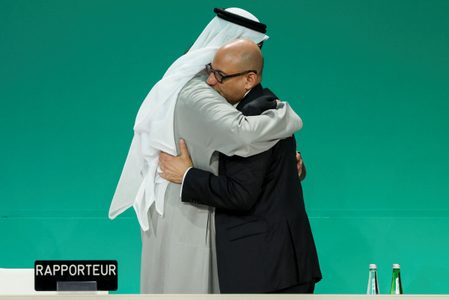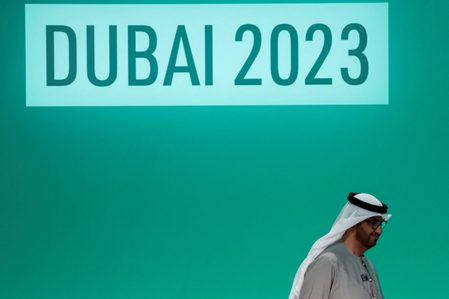SUMMARY
This is AI generated summarization, which may have errors. For context, always refer to the full article.

The 28th Conference of Parties was held in Dubai from November 30 to December 12. However, the official end of the plenary was on December 13th. Advertisements and inspirational quotes were seen plastered all over the city, urging people to “make a change.” All eyes were on Dubai as almost 70,000 participants in COP28 from all over the world anxiously awaited the establishment of the Loss and Damage Fund and the outcome of the first Global Stocktake (GST).
The Klima Team of Manila Observatory (MO) was in Dubai during the whole length of COP28, and this is our preliminary analysis of the outcome. We were there as a member of Allied for Climate Transformation by 2025 (ACT2025), a consortium of think tanks and experts elevating the needs and priorities of vulnerable developing countries to deliver ambitious, balanced, just, and equitable outcomes at the UN climate negotiations and chart a path toward greater global solidarity. Our work in COP28 was also supported, among others, by The Samdhana Institute.
Several MO affiliated scientists were members of the Philippine Delegation. One of them – Monica Ortiz – co-authored this article but in her personal capacity. Nothing we say here should be attributed as an official Philippine position.
What is the Global Stocktake?
The Paris Agreement’s Global Stocktake (GST) is a unique opportunity to drive global climate action and support and increase global cooperation on long-term climate goals. Designed to take place every five years, it aims to create evidence-based collective learning to inform future decisions and ramp up necessary climate action and support, both nationally and globally. The GST aims to inform countries’ new climate plans, known as nationally determined contributions (NDCs), in 2025 and every five years thereafter.
The first Global Stocktake (GST) was launched in 2021 and concluded in December 2023 at the UN Climate Conference in Dubai (COP28).
In June 2023, Parties concluded the technical assessment phase of the GST and launched the final, political phase of the GST, known as the “consideration of outputs.” The final synthesis report for the technical assessment phase was issued in September 2023 and highlighted 17 key findings that informed the negotiated outcomes of the GST at COP28.
The synthesis report found that climate action and ambition have increased since the adoption of the Paris Agreement, with progress seen across all fronts. However, scale, depth, and pace are not in keeping with a 1.5°C pathway that ensures a climate-resilient future.
Fossil phase-out language
In Dubai, in the earlier drafts of the GST, “fossil fuel phase-out” was included in the language. However, on the morning of December 13th, the fifth draft of the GST was released, and much to the dismay of many, the language had changed. Instead of the much anticipated (and expected) language of fossil fuel phase-out, the language took a much more conservative stance, stating that Parties are being called on to transition away from fossil fuels in energy systems.
This language is much more suggestive than it is definitive. It is understandable that many civil society organizations in the Philippines were disappointed with this outcome. It seems that the text favors only a few, when it should be favoring all – it almost ignores the Global South who contributes the least in emissions but takes the brunt of the effects of climate change.
During his opening remarks, COP28 H.E. President Sultan Ahmed Al Jaber had stated that he was “focused” on the 1.5 C temperature goal under the Paris Agreement. And just a few days later, His Presidency was quoted saying that there is “no science” behind fossil fuel phase-out in limiting the impacts of climate change. His Excellency’s stance on fossil fuels may very well have impacted the turnout of the final text of the GST.
But still, we remain hopeful. It is not the language we have been lobbying for, but it is a step towards the lessening of the burning fossil fuels. It is a step towards mitigating the effects of climate change. Despite the language calling for “transitioning away” instead of a full phase-out, the text did include language that was both clear and directive, including “tripling renewable energy capacity” and the “phase-down of unabated coal power.” It is also worthy to note that the text also “notes with significant concern” that global greenhouse gas emissions trajectories are not in line with the 1.5C goal under the Paris Agreement.
We are also hopeful because the Philippine Delegation did modestly well. Environment Secretary Toni Yulo-Loyzaga, head of our delegation, was hands-on in the negotiations. She was assisted ably by Climate Change Commission Vice-Chair Roberto Borje, Environment Undersecretary Analiza Teh, Energy Undersecretary Wimpy Fuentebella, Finance Undersecretary Alu Dorotan Tiuseco, and other officials. Ambassador Leila Lora-Santos and other diplomats were also in the delegation. Finally, we were also fortunate to have Attornery Vice Yu, arguably among the best climate negotiators from developing counrties, in our delegation.
For the first time in seven years, the Philippine Delegation was receptive to inputs of civil society. Among others, for the first time in almost a decade, the Delegation also had an official youth delegate in Javea Fernandez Estavillo. Seventeen-year-old Javea is also affiliated with the Manila Observatory as a research staff of our loss and damage team. This could be improved of course in subsequent meetings, including appointing more civil society experts and youth delegates in the official delegation.
Throughout COP28, it had been emphasized that it is the first time in history that the COP Presidency was a Big Oil executive and that his connections with other energy companies would make waves in the final decision text. And it is true: earlier on in the COP, the Loss and Damage Fund had been established, and subsequently, the Parties decided on the host for the Santiago Network for Loss and Damage. However, despite this big win, it can be said that the strides this presidency was taking had peaked early on. The strong start of the COP waned faster than it should have.
The inadequacy of the Dubai outcome
The Global Stocktake is a document agreed upon by Parties that reflects the status of our efforts towards the Paris Agreement. Scientific bodies like the IPCC have long advised the world of the need for urgent, effective, and equitable adaptation and mitigation actions to “stand a chance” of limiting global warming to 1.5 degrees Celsius. This is a point of no return; beyond this threshold lies the risk that our precious, megadiverse coral reefs in the Philippines disappear forever.
This urgency was recently re-emphasized by scientists prior to COP28, stating that “the science is clear: we need net zero carbon dioxide emissions by 2050,” calling for a phase-out of coal by 2050 and rapid phase-down of oil and gas. While being praised for being a pioneering text that attempts stronger language on reducing fossil fuels, the devil is in the details.
The Global Stocktake uses the word “transition away” instead of “phase-out” of fossil fuels. It only refers to the “phase-down” of unabated coal power rather than a complete phase-out.
The text also does not mention stopping approval of new investments in fossil fuel infrastructure, a crucial step for a phase-out. Thus, although COP28 president Sultan Al Jaber rightly claimed that, “We have language on fossil fuel for the first time ever,” and that the best available science informs the Global Stocktake, its language falls short of the pathways clearly outlined by science for keeping the 1.5°C goal. 2023 has already been the warmest year on record, we have very little time to waste to phase out fossil fuels.
Indigenous Peoples
Indigenous Peoples are at the forefront of environmental protection, and yet there was only little mention of them in the GST text. In fact, they were not even part of the agenda for COP28. Being at the frontlines of protecting the environment, the IPs’ knowledge must be given the most weight and consideration. It is worth noting that the draft mentioned Indigenous Peoples in paragraphs 9, 55, 61, 63 (g), 116, and 158.
In Paragraph 9 particularly, the text acknowledged IPs as one of the stakeholders in the implementation of sustainable and just solutions to the climate crisis. Paragraphs 55, 61, and 63 acknowledged IPs’ knowledge alongside the best available science and local knowledge. Paragraph 116 recognizes the role of the Local Communities and Indigenous Peoples Platform in strengthening Indigenous Peoples and Local Community’s capacity to engage in intergovernmental processes in climate policies and actions. Article 158 somewhat echoes paragraph 9 in recognizing the active participation of non-parties including the IPs.
Hopefully, these are not mere words to show token inclusivity but a genuine show of sincerity to finally listen and acknowledge the role of the Indigenous Peoples in the fight against climate change and environmental protection.
With the agreement of nearly every country in the world to “transition away from fossil fuels,” this could mean furthering operations of extractive industries in order to acquire just energy transition minerals. In the Philippines, entry and operations of extractive industries has always been equated to human rights violations especially to the IPs who have been showing strong opposition to the entry of these companies in their ancestral lands. The transitioning away from fossil fuels should not perpetrate more human rights violations but to the inclusion of the IPs to achieve just transition.
Climate finance and just transition
These same concerns are apparent in the discussions all throughout the text – that is, we’ve come a long way but plenty more remains to be seen. Finance pathways, for instance, remain scant. While the Loss and Damage Fund was operationalized, the current pledges are around $700 million, only 0.2% of the needs of developing countries. There is also no clarity yet as to whether these pledges are new and additional, as opposed to reallocated from existing finance streams. While just transition was mentioned in the text, there was no clear way that was discussed in order to finance this transition – civil society calls for a just transition that is fast, fair, and fully-funded. The New Collective Quantified Goal (NQQG) is still far from fruition. Finance, therefore, remains to be the biggest hurdle in meeting the 1.5C temperature goal of the Paris Agreement. This is something that will need to be prioritized in the coming weeks and months.
Ways forward
For the Philippines’ part, we applaud its proactive steps with regard to the loss and damage agenda item, including its bid to host the Board – which Secretary of Environment Yulo-Loyzaga said the Philippines was in the best position to do – and its acquisition of a seat in the inaugural Board. The Philippines will represent the Asia-Pacific Group for 2024 and 2026; in 2025 it will serve as an alternate member, sharing the term with Pakistan. This signals and shows the country’s commitment and leadership in the climate negotiations. However, this is only one step forward – we also need to make sure that the country increases its work on adaptation and just transition, and update its NDC, among others, and implement the work on the ground.
While we can be both optimistic and critical over the recent release of the GST, the real challenge after the culmination of COP28 is how to translate this text into tangible and effective actions that can be felt in the grassroots. It is good that there is more emphasis on the science; it is good that we have started to call out the elephant in the room and the biggest cause of the climate crisis: fossil fuels. But that is just the first step. Developing policies is one thing, but implementing these policies is a completely different monster. It is up to our leaders to ensure that the most important stakeholders feel these policies. It is up to us, civil society, researchers, practitioners, activists, and advocates, to hold our leaders accountable to the text. While it is not a legally binding text, it is a document that will certainly help us to get from where we are now, to where we want to be in the future.
COP28 has ended. The work, the truly important work, begins now. – Rappler.com
Tony La Viña teaches constitutional law at the University of the Philippines and several Mindanao law schools. He is former dean of the Ateneo School of Government.
Tony La Viña, Hazel Acero, Jayvy Gamboa, Thea Uyguangco, Joy Reyes, Laurice Jamero, and Monica Ortiz are members of the Klima Team of the Manila Observatory.
Add a comment
How does this make you feel?








There are no comments yet. Add your comment to start the conversation.